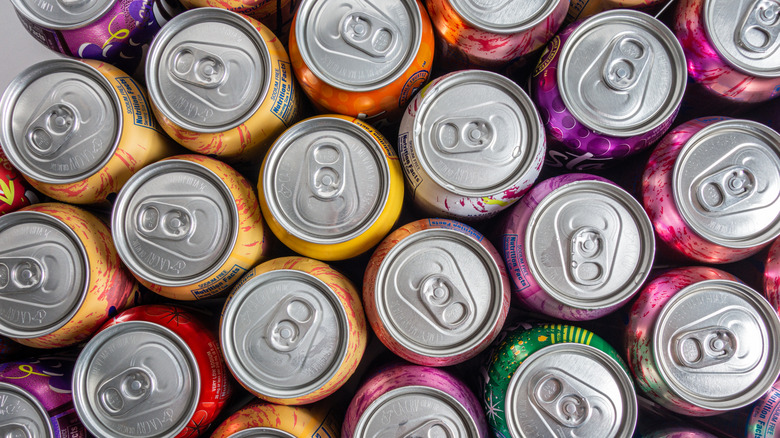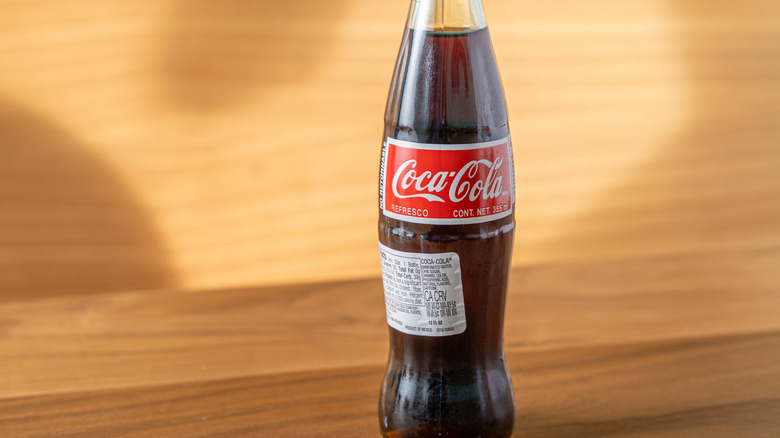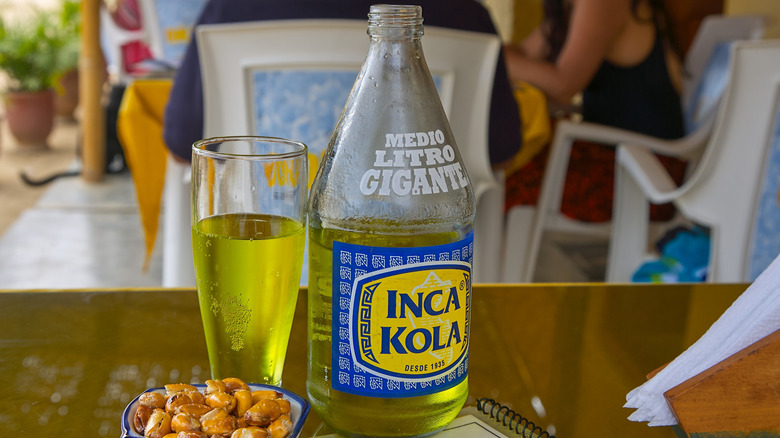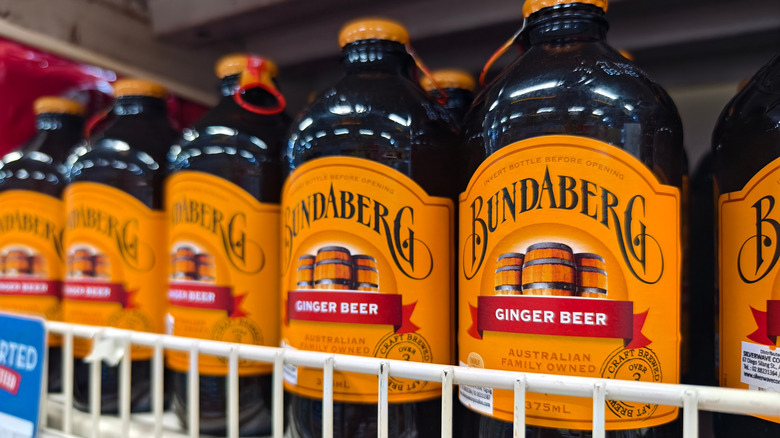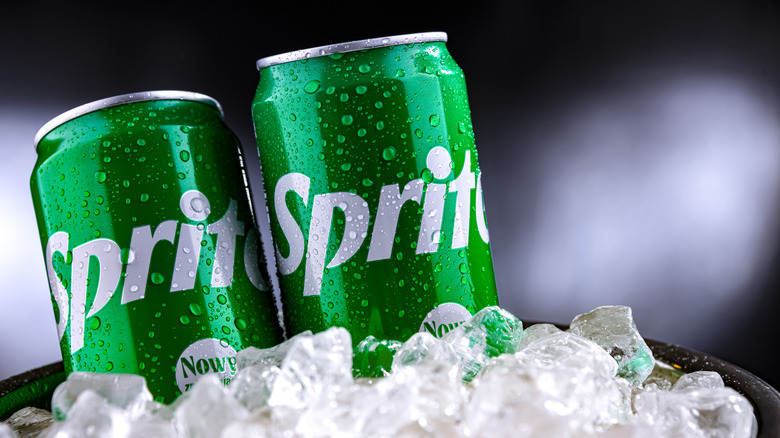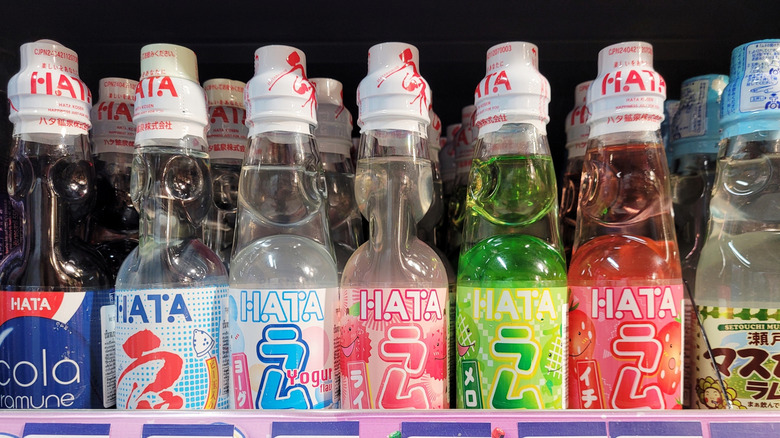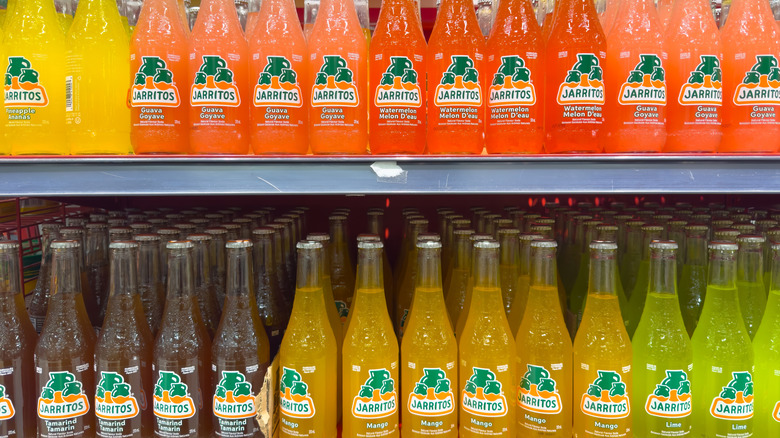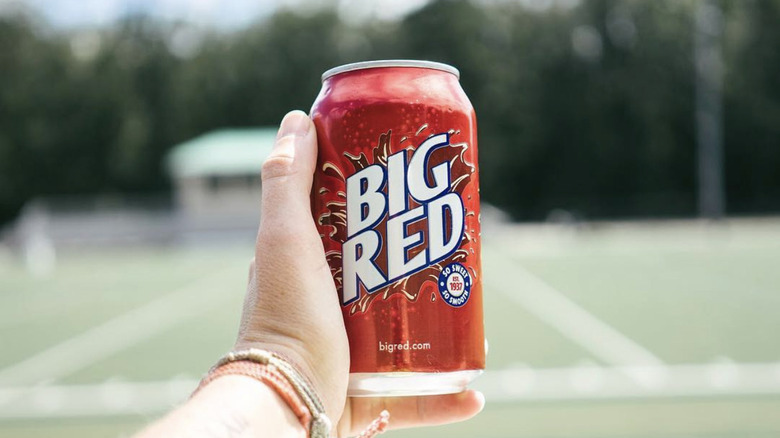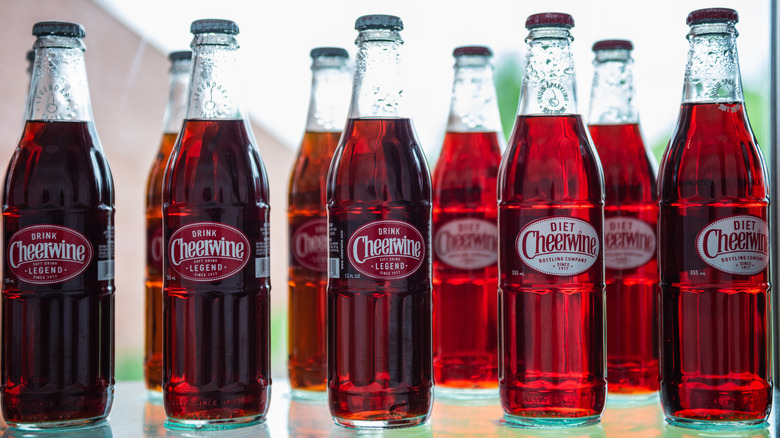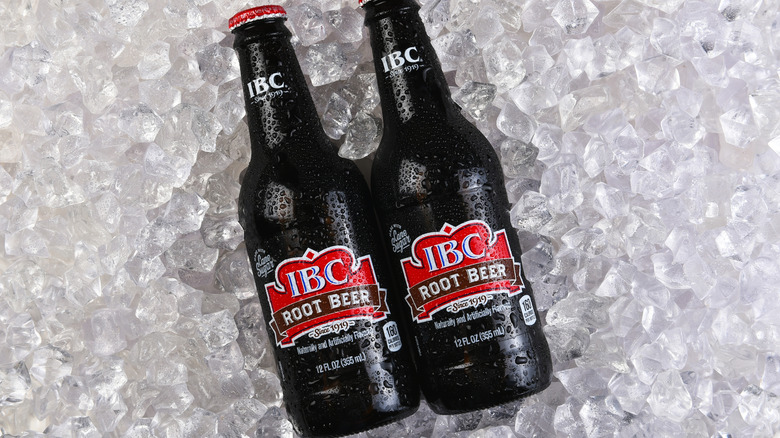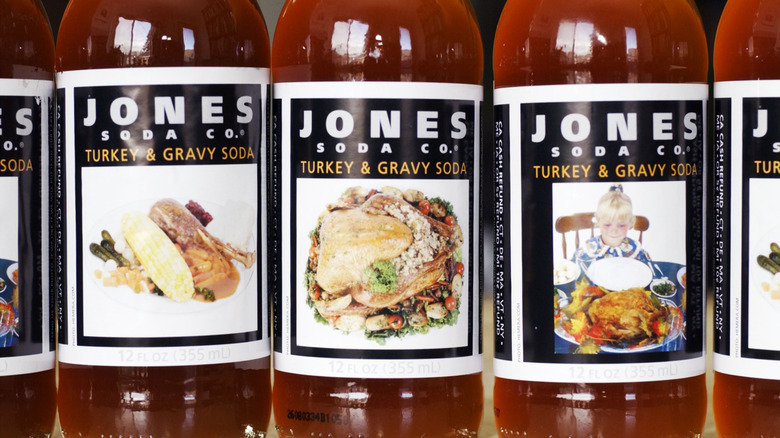10 Best Sodas For Mouthwatering Marinades
The suggestion to use soda to marinade meat might seem odd at first — really? A sweet, carbonated beverage in a savory recipe? Early in my cooking career, I was making a marinade for pulled pork when a chef I worked under pulled out a can of Coca-Cola and dumped the whole thing in. I was apprehensive at first, but that apprehension turned to conviction when I tasted the juiciest, tenderest, most flavorful pulled pork I had ever had — and now I often use sodas to marinate meat in the restaurants I cook in.
The science behind using soda for meats is pretty straightforward: it's acidic, and depending on the soda, sometimes even more acidic than lemon juice. That acidity breaks down the muscle fibers of meat and begins to tenderize them before you even start cooking. Beer and wine are often used in marinades to accomplish the same goal, but these products offer a much more complex flavor.
You can achieve this same effect of tenderization with sparkling water, but the carbonation will tenderize the meat without adding flavor. The beauty of using sodas is that there's a whole variety of flavors out there that will pair swimmingly with different meats, vegetables, fruits, and even tofu, all flavoring your food much more conveniently and easily.
Mexican Coke
Many people say that soda out of a glass bottle just tastes better, which is one reason why Mexican Coke is revered as the "better" Coke for many people. The natural cane sugar used to sweeten Mexican Coke instead of high fructose corn syrup also makes it many chefs' preferred choice when cooking (although a can of American Coke is sure to do the trick just fine).
Coca-Cola is most commonly used in pulled pork, but this classic soda's vanilla, almost peppery flavor pairs well with just about any meat — and beyond. If you're caramelizing onions, deglaze your pan with Coca-Cola and enjoy the rich caramel flavor achieved after cooking them down a bit more.
Coca-Cola tofu has even become a popular recipe for flavoring the soybean-based protein. Simply deep fry squares of tofu, pat the excess oil off, and add them to a fresh pan to reduce in a sauce of Coke, soy sauce, ginger, and garlic. The result is a teriyaki-reminiscent sauce that perfectly clings to the tofu and coats it in a sticky flavor.
Inca Kola
This soda is lesser known for most Americans — unless you frequent your local Peruvian restaurant which is sure to have a fridge stocked full of these blue and gold cans or bottles. Created in 1935 by a British immigrant to Peru, this soda was cleverly marketed with symbols of national pride and is now the standard soft drink of the country.
The base of Inca Kola's flavor is lemon verbena, a green leaf that has a surprisingly lemony smell and flavor. Although the flavor of this yellow, fizzy beverage isn't super citrusy — some liken the taste of Inca Kola more to bubblegum or cream soda.
Whatever the flavor, one thing's for sure: it pairs beautifully with Peruvian classics like lomo saltado or roasted chicken. And if it pairs well after the cook, why not add some before? Add a bit of Inca Kola to your beef marinade to help tenderize the meat and infuse it with a bit of sweet lemony essence.
Ginger beer
Ginger beer offers a lovely kick of warmth that complements many ingredients. Ginger ale is more on the sweet side, but ginger beer brings more peppery ginger spice that adds great flavor to marinades.
Ginger soda pairs especially well with common Asian ingredients like soy sauce, miso, fish sauce, garlic, and green onions. Think miso salmon, with the salmon lightly marinated in ginger beer mixed up with some miso paste. It won't take long for the fish to soak up the sweetness of the ginger beer and the salty umami of the miso, and it's sure to caramelize nicely in the pan.
For a tender and flavorful chicken, use ginger beer in the marinade. If you intend to add a bit of ginger to your stir-fry marinade, throw in a hearty splash of your favorite ginger-flavored drink to bring up the flavor a notch and help tenderize your meat. You can even use ginger ale that's gone flat as a marinade and glaze for roasted vegetables.
Sprite
Sprite's lemon-lime flavor makes it a logical pairing with seafood, which has been a common practice in the Philippines for a long time. The Filipino dish Halabos na Hipon is an easy recipe for cooking fresh shrimp in Sprite with a sprinkle of salt. The salt and acid soften the bite of the shrimp while adding just the right amount of flavor.
In the same way that a traditional ceviche uses the acidity of citrus juice to "cook" seafood (sans heat), you can use a splash of lemon-lime soda to add a fizzy effect to any ceviche, whether it's made from fish, shrimp, octopus, or squid. The acidity and sweetness of the soda will firm up your seafood to the perfect texture.
You can, of course, use one of many of the other flavors of lemon-lime soda, such as Mexican Sprite or Jarritos lime flavor, which use cane sugar instead of high fructose corn syrup and thus have a punchier (and healthier) flavor. Swap it out for a grapefruit-flavored soda like Squirt or Jarritos grapefruit for a slightly more bitter effect.
Unique fruit-flavored sodas
Ramune is a Japanese soda that might look like a bit of a puzzle at first with its unique bottle design that houses a marble in the neck; if you're unsure how to open it, follow the instructions on its plastic label. There are several flavor options for Ramune, but perhaps the most unique (and delicious) are the melon and lychee flavors. You could use this soda for the savory options discussed above, but they are particularly well suited to dessert.
Maceration is a technique chefs use to make fruit extra juicy and flavorful. Macerating strawberries, peaches, or other fruits in a mix of sugar, lemon juice, and perhaps a pinch of salt softens the skin, releases more flavor, and tenderizes the fruit to feel perfectly ripe. If you've ever ordered a strawberry shortcake at a restaurant and wondered how the strawberries tasted so gosh darn good — they were probably macerated. Instead of sugar and citrus, try soaking your favorite fruit in a Ramune marinade to create a beautiful topping for your favorite fruity dessert.
Jones also offers a green apple soda that would be a delicious marinade for caramelizing onions. Start the process of cooking your onions and add a few splashes of soda towards the end to deglaze your pan. Serve these caramel delights on top of baked brie or with pork chops and roasted apples.
Tropical fruit sodas
There are many different brands that offer juicy and refreshing tropical-fruit-flavored sodas. Fruits like mandarin, guava, pineapple, and tamarind are often used in many Mexican and South Asian recipes, which makes the soda version of these fruits a great option to swap in for added flavor.
Jarritos, Fanta, and Crush all make pineapple sodas. If you've ever had irresistible al pastor tacos, then you know that pineapple pairs wonderfully with this seasoned pork. Add a bit of this refreshing soda to your marinade before cooking up your al pastor tacos to really make their Mexican flavors shine. Orange juice is often used in marinades for carne asada, so why not swap it out for a bit of Fanta orange or Jarritos mandarin? They'll add extra tenderness to your meat with a boost of citrusy sweet flavor.
Jarritos also makes first-rate tamarind and guava soda that works perfectly to marinate meat for South Asian curries. Tamarind is a tropical fruit that resembles a legume and can be found in paste form; it's used primarily to flavor beef, but its rich molasses flavor has just a hint of tang and is pretty multifaceted. The soda version would be great for softening beef, pork, shrimp, or macerating peaches for cobbler. Guava soda would work especially well as a marinade for chicken, or for any curry meat that you want to take on a bit of sweetness alongside those curry spices.
Big Red
If you've ever been to Texas, then you already know that Big Red is a big deal. You can find this brightly colored soda in almost any corner store, BBQ joint, or restaurant in the Lone Star State. Created in Waco, Texas in 1937, it's as red as the name says and sweet like a Southern iced tea. Reminiscent of a fruit punch but with a hint of vanilla that adds a cream soda effect, this fizzy drink is commonly used in Texan desserts like Jell-O, ice cream, and as a cake flavoring.
Although Big Red is super sweet, it's not uncommon to find it in savory dishes, too. The internet is full of recipes from Texan chefs using Big Red as the base for BBQ sauce that's then glazed onto pork ribs or served on the side of meat platters. Speaking of pork ribs, why not add some Big Red to the marinade while you're at it. Pork pairs well with fruity or sweet flavors, and the orange and lemon oils used to flavor Big Red make it an easy addition to marinades for pulled pork or ribs while the acid and sugar work to tenderize your meat. The Red 40 used to dye this soda is also a key ingredient in making the marinade for red-dyed pork char siu. Try marinating your meat for this Chinese barbecued specialty with Big Red instead for added sweetness.
Cheerwine
This cherry-flavored soda was created in North Carolina and remains so popular in the state they even have a yearly festival for it. It boasts a unique cherry flavor that is close to black cherry, but slightly brighter. It's aptly named for its deep red color resembling red wine, and it isn't as carbonated as most sodas, making it more juicy.
Cherry is a flavor that pairs deliciously with pork, lamb, and chicken, and Cheerwine can be used in marinades for any of these meats. In fact, it's so commonly consumed and used in North Carolina that the brand has pages and pages of recipes on their website for everything from pulled pork to ice cream to brined pork chops.
If you're having trouble finding Cheerwine, you can easily find another cherry-flavored soda alternative such as Jones cherry cola, Boylan black cherry, Poppi cherry cola or cherry lime-ade, or 7-up cherry flavored soda.
Root beer
This American staple, which originally got its name from the sassafras tree root it was made from, is a great soda to include in savory dishes. Root beer has a complex flavor that originally came from ingredients like sassafras, sarsaparilla, and wintergreen in health tonics (although two of these ingredients have since been banned for their carcinogenic effects). Nowadays it's generally made with anise, wintergreen, and sometimes ginger, molasses, or licorice — although every brewer tends to have their own unique recipe.
Root beer's unique spiced flavor, complemented by a hint of mint from the wintergreen, is especially well suited to use with lamb. Try adding root beer to your marinade and braising liquid for lamb shoulder or ribs. You could also use it to deglaze your pan when you sear lamb chops. Add a bit of mint sauce as a finishing touch to complement its herbal flavor.
The list of root beer brands to choose from is endless, but if you're cooking expensive lamb with it you should look out for brands that use cane sugar instead of high fructose corn syrup, and that have a more herbal than sweet flavor like Jones, Boylan, or IBC. Root beer is so popular in the States that you may have noticed a lot of local beer breweries adding it to their house tap list as a non-alcoholic option. This would be a great way to source a high-quality root beer for your next recipe.
Savory sodas
While savory sodas aren't something you usually see on the shelf of your local grocery store, there are a few brands that offer sometimes shockingly flavored bubbly beverages, like Lester's Fixins sweet corn, ranch dressing, or bacon-flavored sodas.
Many of the savory sodas brands release are meant more as a tongue-in-cheek kind of attention grabber than they are meant to be something people actually want to drink. Take Jones' Turkey and Gravy flavored limited release for example: it's not something people are raving about for its refreshing qualities, but if you used it as an addition to a turkey brine the bouillon flavoring would blend right into your turkey and the carbonation helps to break down those muscle fibers.
A more logical route to savory sodas is those that use botanicals. A few brands, such as Casamara, make non-alcoholic sodas out of the same botanicals used to make the Italian liqueur amaro. These unique beverages add extra flavor and tenderness when used in marinades for lamb, chicken, pork, or beef, which will pair wonderfully with many Italian recipes.
